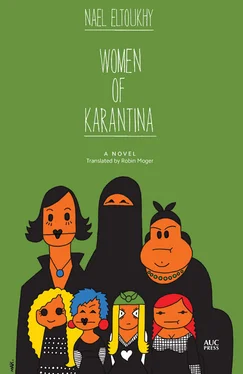Ali didn’t talk too much, just spoke of Ain Shams and Cairo, from which Sousou gathered that they had not, in fact, come from Sohag. He asked him what he had done before he came to Alexandria and Ali spoke of the clothes store. He asked him what had brought him here and Ali almost spoke. . and was silent. He was silent a long time; then he said that only God knows what’s best for us. The answer did not convince Adel, who, though not partaking of the hash, had drunk nine beers. This made him punchy. He drew closer to Ali and asked if he had a hundred pounds on him so he could go downstairs and settle up with the owner of the bottle store. He’d pay it back tomorrow. Ali fell for it. He took out his wallet and Adel snatched it away and extracted the ID. Before he could glance at it, Ali had jumped on his back and brought a knife to his neck. You want to ask me something, then ask nicely, otherwise I’ll hurt you.
Sousou had drifted away under the influence of the hash. Suddenly he came to and went over to try to calm Ali. Ali shoved him away. A full minute, then Ali got to his feet and made for the door. Before walking out he took a hundred pounds out and tossed it in the air. That’s for the beer. I won’t have any man invite me over and think he can shame me. Abu Amira watched it all unfold. He did not intervene to defend his brother.
Ali went home. For a week afterward a question kept returning to Sou-sou’s mind: Who is that man?
Adham Sabri. This had been Inji’s idea of a hero ever since reading of his exploits while in the Emirates, and after she was back in Egypt, too. It was then that her obsession with the secret service started. She imagined her life as one long adventure in which everything combined: action with drama, patriotic fervor with burning desire. She would dream — in some part of herself — of heroism. For this reason, perhaps, deliverance from this secret life was her only wish. The hero doesn’t hide from the cops, because the hero is the cops. . so she saw it. She was young and knew nothing of life.
The evening Umm Amira came to visit her and they talked together till two in the morning, Inji discovered that there were some subjects she couldn’t speak of and others she must first work out with Ali how to talk about, before either of them, individually, could speak of them with someone else. It struck Inji that there was an area of her life that had become secret, and she wept. Umm Amira cried out, What’s up, sister? I upset you? and Inji began to dry her eyes. No, I’m sorry, Umm Amira. It’s me that’s upset you. Forgive me. At that very moment Ali came in. Umm Amira was at a loss. She stood up, making for the door, to leave. Inji pressed her to stay the night with them, and she stayed. Inji made up a small couch in the hall for her and Ali went off to sleep beside his wife.
At five in the morning Ali felt thirsty, after his sleepless night the day before. He got up, opened the fridge, and gulped down a whole bottle of water. He made his way back swaying and as he swayed he saw Umm Amira with her robe hitched up off her legs, a little stout but never mind. He started to scratch his cock, his hand in his trousers. He drew closer. Bent down. . and almost fell, then suddenly she was holding him steady, her finger to her lips. Don’t make a sound.
*
Never before had Ali slept with a woman he didn’t know — with the exception of whores, of course — and since marrying his wife had never once betrayed her. His devotion to her was forged in fire.
That day, however, a number of factors worked together to inspire in him a lust for Umm Amira: first, the beer that filled his stomach; second, that he sought, by sleeping with her, to revenge himself on her husband, after his brother Adel had tried to take his ID from him by force and he had failed to intervene (this, then, is the purest revenge: revenge for the sake of revenge); third, that he wanted to immunize himself against his ill will, in the event that Adel had seen something on the ID card — that he was registered in Cairo or was a bachelor (this is procedural revenge: revenge with a purpose and function); and fourth and finally, that he really was aroused. She was filthy, and smelt disgusting — the reek of rot and cheap booze — and this just aroused him all the more.
From the start of their marriage Inji had only permitted him to sleep with her at the beginning of the week. Later on the bouts of depression and revulsion started, and Ali was only human, blood and neurons, from time to time subject to his base needs, among them sex.
In two hours Ali had given her one three times, none of them up to scratch, it’s true — poor hygiene can put a man off his stroke — but he was pleased with himself and his self-satisfaction carried him into his bedroom on tiptoe. He emerged and handed Umm Amira fifty pounds, told her tenderly, Buy something nice for Amira, then went back into the bedroom. Three hours later he awoke, showered swiftly, and left with Inji to open up the store.
Thus ended the most important day in the lives of the young couple, Ali and Inji. The days that followed were simply the payoff.
Sousou, Adel, Abu Amira, Umm Amira: a family of three brothers and one wife inhabiting the rooftop of an ancient building in Camp Cesar. Like many other families their roots were in Sohag. Sousou worked a liver cart and Adel had a spot on the sidewalk in Ramleh Station from which he sold boxers and vests, as well, lending Abu Amira a hand. Abu Amira was a doorman, if we must use that word.
Adel was a dud. Ali saw it from the way Abu Amira looked at him the time he snatched the wallet: petty, adolescent, no class. Sousou was smart. Abu Amira depended on him for a lot of things. He’d hear about the kids looking to rent apartments and he’d hear of landlords in the area looking to rent out their apartments, and he’d bring an even greater number of young men and women to the second-floor apartment that the building’s owner rented out by the hour to those in need. Abu Amira was an estate agent too. And a pimp, if we must use that word.
Abu Amira was preparing Sousou to take his place. He loved him. He was the only one who reminded him of his own youth and he liked to fancy himself his father and not just his brother, a sentiment that made its way down the chain to Umm Amira. She treated him like she was his mother.
The night Ali slept with Umm Amira he told her, Buy something nice for Amira. She did not answer him, because she was a wise woman, and not so dizzy as to tell him the whole tragic tale, the tragedy of Amira, who had died aged ten. People had gone on calling her mother by her name. She heard them, suffered, held her peace, and took herself away. She swallowed her pain and took herself away.
Inji. We would be doing her an injustice if we said that all she did those days was feel revulsion at the world around her. She was fashioning her baby in her belly as well — the mother’s sacred role, and also, perhaps, the chief cause of her revulsion. Ali did not take this in. He was young and inexperienced. Killing a human being is not an experience of great importance. He asked her once, D’you want us to go back to Cairo and give birth there? and she turned her face away. God rot you, he whispered to himself and let her be.
It was around this time that Inji was getting to know a customer who would come and visit her in the shop. Hagga Itemad was her name. The hagga took the initiative. She told her she looked like a stranger to the neighborhood, by which she meant the foreign accent. Inji told her she’d studied politics and economics, and the next day Hagga Itemad returned and shyly asked if she would help her daughter with her English. The girl’s struggling with her English, and as for you, there’ll be a car to pick you up and bring you back, and whatever you ask for you’ll have. I won’t haggle. Inji agreed without even asking Ali. She informed him of it once, speaking rapidly in the tone of someone who’s made up their mind, and he didn’t object. He hadn’t the courage to object.
Читать дальше












